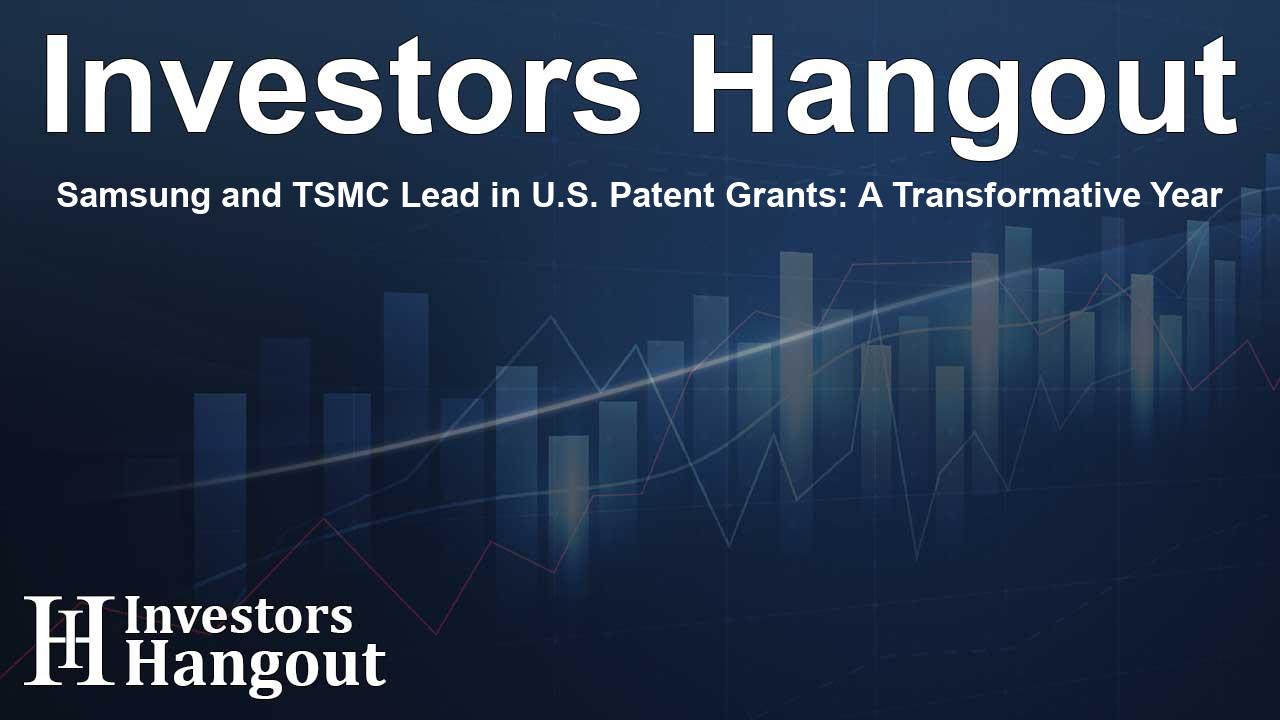Samsung and TSMC Lead in U.S. Patent Grants: A Transformative Year

Samsung Maintains Patent Leadership in the U.S.
In a significant development for the tech industry, Samsung has emerged as the dominant force in U.S. patent grants for the third consecutive year. According to the latest data from a leading patent analytics firm, the company witnessed a steady increase in its patent portfolio, showcasing its robust research and development efforts. The recent uptick, following four years of decline, demonstrates a revitalized innovation landscape in the U.S., with patent grants rising by 3.8 percent to a total of 324,043.
TSMC Seizes the Second Spot
Notably, TSMC has made impressive strides in the patent arena, climbing into the second position this year, surpassing Qualcomm. This marks a pivotal shift as TSMC, renowned as a leading contract chip manufacturer, reinforces its commitment to innovation amidst a tech ecosystem that is continuously evolving. The company filed an impressive 3,989 patents, reflecting an 8 percent growth from the previous year.
Shifts in Ranking Within the Top Firms
While Samsung tops the rank with 6,377 patents, Qualcomm, which previously held the second spot, faces challenges as it tumbled to third with a decline of 11 percent. Meanwhile, Apple and Huawei have also boosted their positions, continuing to innovate and adapt in a competitive market.
The State of U.S. Patent Applications
This year's data not only highlights the patent grants but also indicates a bustling environment for patent applications, which reached an all-time high of 430,625, up 3 percent from the previous year. This increase is a strong indicator of the thriving U.S. innovation economy, showcasing a surge in technological advancements and the competitive spirit among companies.
The Role of the USPTO and Backlogs
As patent activity rises, the United States Patent and Trademark Office (USPTO) is actively addressing the backlog of unexamined applications, which climbed to 813,000. The USPTO's hiring initiatives for examiners are evident, contributing to the positive trends in patent grants and applications.
Key Player Analysis: Samsung's Growth
Samsung's resilience in maintaining its lead in patent grants is commendable. From 6,165 patents last year to 6,377 this year, the company is strategically investing in its intellectual properties, highlighting its focus on innovation. Nearly 2 percent of all U.S. patents were granted to Samsung, a testament to its strong R&D framework.
Challenges for Legacy Companies
Conversely, IBM, which once held the top position for 29 years, has seen a drop in its rankings, reflecting a shift in strategy as the company now adopts a more selective approach to patenting. This change comes amid increasing competition from tech giants such as Apple and Google, which are gaining ground in the patent landscape.
Global Context of Patent Grants
While American companies secured the highest number of patents, a notable 56 percent of all patents granted were acquired by firms outside the U.S. Japan and China are emerging as strong competitors, with a substantial number of patents granted in their names. This underscores the global nature of innovation and the importance of an extensive patent strategy for companies aiming to maintain a competitive edge.
Emerging Technologies Shaping the Future
The report also emphasizes the fastest-growing technologies, indicating a shift towards sustainable innovations. Technologies focused on reducing waste and improving efficiency are rapidly gaining traction, capturing the interest of investors keen on identifying future trends.
Conclusion and Industry Implications
In conclusion, the landscape of U.S. patent grants holds promising developments, with companies like Samsung and TSMC leading the charge. The trends showcase not only the competitive spirit among technology firms but also the importance of advancing innovations that cater to today’s challenges, including sustainability. Observing these shifts can provide invaluable insights into future investments in a continuously evolving technological environment.
Frequently Asked Questions
What makes Samsung a leader in U.S. patent grants?
Samsung's consistent investment in research and development has allowed it to secure a high number of patents, maintaining its position as the top innovator in the U.S.
How has TSMC improved its patent ranking?
TSMC has focused on innovation and increased its patent applications significantly, which helped the company rise to the second spot in patent rankings.
What is the significance of the increase in U.S. patent applications?
The rise in patent applications signifies a strong innovation economy, as more companies seek to protect their technological advancements and intellectual properties.
Why is the USPTO's backlog important?
The backlog of unexamined patents influences the patent landscape, and addressing it ensures that innovations are reviewed and granted protection in a timely manner.
What role do global competitors play in the U.S. patent space?
Global competitors like Japanese and Chinese firms present significant challenges, as they secure a large portion of patents, influencing technology trends and investments worldwide.
About The Author
Contact Kelly Martin privately here. Or send an email with ATTN: Kelly Martin as the subject to contact@investorshangout.com.
About Investors Hangout
Investors Hangout is a leading online stock forum for financial discussion and learning, offering a wide range of free tools and resources. It draws in traders of all levels, who exchange market knowledge, investigate trading tactics, and keep an eye on industry developments in real time. Featuring financial articles, stock message boards, quotes, charts, company profiles, and live news updates. Through cooperative learning and a wealth of informational resources, it helps users from novices creating their first portfolios to experts honing their techniques. Join Investors Hangout today: https://investorshangout.com/
The content of this article is based on factual, publicly available information and does not represent legal, financial, or investment advice. Investors Hangout does not offer financial advice, and the author is not a licensed financial advisor. Consult a qualified advisor before making any financial or investment decisions based on this article. This article should not be considered advice to purchase, sell, or hold any securities or other investments. If any of the material provided here is inaccurate, please contact us for corrections.
